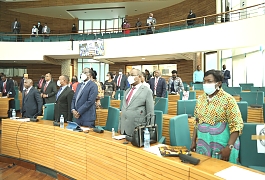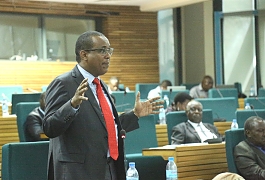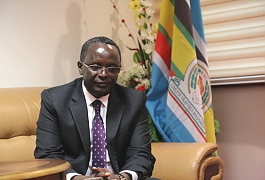Whereas the 5th Inter – Parliamentary Relations Seminar (Nanyuki V) was successfully convened on 27th – 31st January 2010, in the august House of the Burundi National Assembly in Bujumbura, Republic of Burundi under the theme “The East African Common Market – Prospects, Challenges and Opportunities”
Noting that the Bujumbura Seminar was well attended by key stakeholders including the Hon. Speaker (EALA), the Hon. Speaker (Burundi National Assembly), The President (the Senate of Burundi), the Chairperson, Council of Ministers, Ministers, Honourable Members of EALA and National Parliaments/Assemblies of Partner States, Deputy Secretaries General of EAC, the Registrar of the EACJ, Ambassadors of the Partner States resident in Burundi and Senior staff from EALA, EAC Secretariat, Civil Society and AWEPA;
Noting further that the overall objective of the Nanyuki Series is to strengthen the functional relationship between EALA and the National Assemblies and to widen and deepen knowledge of EAC and the integration process;
Cognisant of the specific objective of Nanyuki V being to provide an opportunity for Seminar participants to discuss the provisions of the EAC Common Market Protocol, its prospects, challenges and opportunities;
Recognising with sincere gratitude the hospitality extended to Seminar participants by the Hon. Speaker, Burundi National Assembly together with the President of Burundi Senate as well as their contributions to the Seminar deliberations;
Appreciating with great satisfaction and encouragement the honour bestowed upon the 5th Inter – Parliamentary Relations Seminar by H.E. Pierre Nkurunziza, President of the Republic of Burundi, who delivered an incisive Key Note Address and officially opened the Seminar, thereby underscoring the total commitment to the EAC integration process by the Heads of State of Partner States;
Conscious of the under mentioned prospects, challenges and opportunities to be addressed by stakeholders in the EAC integration process at regional and Partner States level as well as development partners.
Prospects:
The Common Market presents:
- Greater capacity for growth and development
- Strategic platform for competitive industrialization
- Diversification of production structures
- Significant step towards sustainable economic integration
- Opportunity to utilize our collective resources for the mutual benefit of our people
- Growth, development and optimum utilization of our resources will lead to greater prosperity that will raise the living standards and improve their quality of life of the citizens of East Africa.
- The policy harmonization in the areas covered by the protocol will strengthen the political, economic, social and cultural ties between our people and promote a people-centered development.
The Challenges
- Policy harmonization to drive the Common Market will place limitations on Partner States to pursue independent economic policies
- Community is a legal person with own power requiring Partner States to confer and cede some sovereignty to its institutions to achieve community objectives.
- Enforcement of anti-discrimination principle in the enjoyment of the freedoms enshrined in the Protocol.
- Institutional and administrative reforms envisaged in Article 76(3) to establish and confer powers on institutions to run the Common Market.
- Sustainability of political will demonstrated by timely implementation of agreed programs.
- Resource availability and priority allocation for regional projects
- Broad Stakeholder awareness of the integration benefits and opportunities
- Adequate linkages between the people, National Assemblies and the EAC Institutions.
- Effective enforcement mechanisms of the laws, decisions and directives.
Opportunities
- Harmonizing the potential of our business opportunities and the participation of the EAC citizens to drive the community
- Gains resulting from more efficient allocation of resources arising from the free flow of factors of production.
- Competition will lead to quality products at cheaper prices for benefit of consumers.
- Social policy embedded in Protocol will improve the human welfare, education, health etc.
- Investment in research, technological development leading to dynamic competition in a knowledge based economy
Now, therefore, the participants of the 5th Inter – Parliamentary Relations Seminar (Nanyuki V) hereby resolve and make the following Recommendations toward widening and deepening the EAC integration process for the equitable benefit of the Peoples of East Africa.
- Proposed measures for facilitating effective partnership between EALA and National Parliaments/Assemblies to promote and popularize EAC Integration as People-Driven Process (PDP)
- Regular interface between EALA/National Parliaments.
- Communication information mechanism between EALA and National Parliaments.
- Sensitize decision makers first (Political and executive).
- EALA regularly brief National Parliaments and have joint platforms.
- Develop action plan on the agenda through Committees on a periodic basis.
- Each Assembly facilitate sensitization and involve EALA/National Parliaments.
- Monthly reports to National Parliaments by EAC Ministers.
- Popularize use of Swahili in meetings and sensitization.
- Establish and operationalise a reporting mechanism between EALA and National Parliaments.
- Amendment of the Treaty to fill the gaps unforeseen at the time the Community was established.
- Institutionalise Chairperson of Summit of the EAC Heads of State address EALA and other measures that have been proposed to sensitize Community.
- Formalize the linkages by legal instrument.
- Harmonize Rules of Procedure of National Assemblies and reporting mechanism to National Assemblies.
- Institutionalize the organic linkages of EALA, EACJ and Secretariat.
- EAC Ministers full time in Arusha for political leadership.
- Strengthen Secretariat to improve implementation.
3. Identified significant gaps that need to be addressed in the EAC Common Market Protocol and propose measures to redress the identified gaps.
- Protocol not known yet to all EALA/National Members – Need to understand it.
- Sovereignty exclusive to PS – ceding some power vital.
- Supranational institutions for EAC to move forward.
- Institutional reforms to effective implementation of Protocol.
- Inadequate practical operational details in Annexes.
- Incomplete Annexes – when will they come into force.
- National Parliament call upon EAC to report on Protocol.
- Communicate these findings to Council and Summit.
- Institutional framework to manage Protocol.
- Publish and disseminate popular version of the Protocol and the Treaty including in briaal.
- Expand the jurisdictional basis of the Court.
4. Proposed measures for strengthening the capacity of key Actors at Regional and Partner State level for effective implementation of approved EAC Programmes and Projects.
- Increase funding for oversight responsibilities for key actors – Harmonized structure for resources mobilization of EAC projects.
- Alternative financing plan for EAC be expedited.
- Effective communication/information strategy on the ongoing integration for key stakeholders.
- Strengthen negotiating capabilities of sub-region.
- Enforcement mechanism for agreed decisions/laws.
- EAC Committees be set up on Partner States to follow-up Community projects.
- Clear punitive measures and accountability for failure to perform and follow-up actions.
5. The proposed role of EALA and EACJ in the involving integration process of the Common Market and the Monetary Union.
- Legislative role
- More involved in integration process – structured approach
- Advocacy, consultations with stakeholders.
- Oversight and representation be strengthened.
- Court interface with National Court.
- Judicial body of the Community on legal matters.
- Full time President Judge and expanded jurisdiction.
- Harmonize laws and ensure supremacy of community laws over national law.
Resolutions
- A robust and comprehensive strategy of awareness creation and sensitization on the EAC integration process be urgently and effectively implemented by the EAC Partner States, and other stakeholders.
- National Assemblies are urged to establish standing EAC Committees as a means to strengthening linkages between EALA and the National Assemblies.
- Partner States are urged to step-up efforts to ensure effective enforcement and compliance with decisions, laws and regulation within agreed timeframes and agree on an effective mechanism for sanctioning non-compliance.
- Partner States are urged to allocate adequate resources for EAC Organs and Institutions in particular EALA to discharge its mandate.
- To the extent possible, Speakers of National Assemblies are urged to maintain consistency in delegations to Nanyuki series for institutional memory and effective follow-up.
- EALA, National Assemblies, EAC Secretariat and Partner States should establish a follow-up mechanism to monitor and provide accountability on implementation of Resolutions of the Nanyuki Seminar series. To this end the Nanyuki V seminar participants welcomed the undertaking by the Chairperson of the Council of Ministers to share the outcome of the Nanyuki series with the Summit.
DONE at Bujumbura this 30th day of January 2010.



